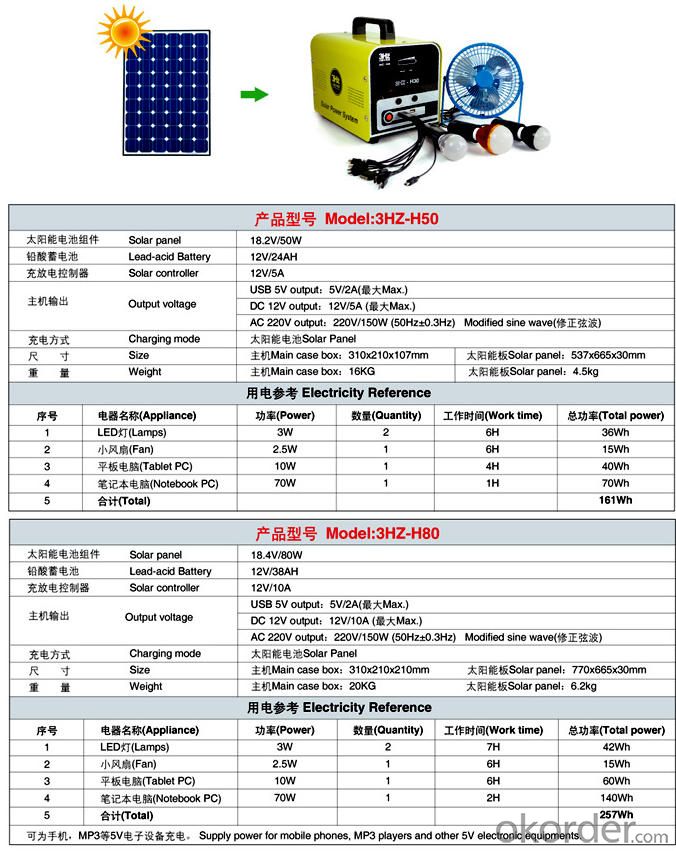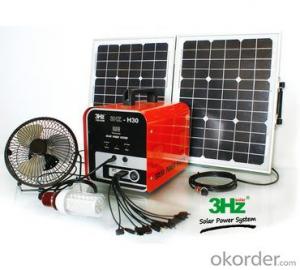solar power system
- Loading Port:
- Guangzhou
- Payment Terms:
- TT OR LC
- Min Order Qty:
- -
- Supply Capability:
- 2000 unit/month
OKorder Service Pledge
OKorder Financial Service
You Might Also Like
Power isn’t always available where and when you need it. Whether you’re hiking in the mountains, camping in the woods, or just plain trying to get away from it all, you need a portable power supply to keep your electronic devices working. Now more than ever, we are dependent on our energy hogging devices to help us live. There’s plenty of free solar power from the sun, so we carry a variety of portable solar power packs to keep you connected. When you need a portable power supply, think of 3HZ-SOLAR!
Our specialty is portable solar power packs, so let us know if you have a special request or question. It’s sometimes hard to know how much power you need for your application. Most of our portable solar power packs require a few extras to charge from the sun, so be sure to check out our complete solar kits. Otherwise, our portable power supply items can be charged from the wall or car. To be truly free, you’ll want to use solar, though.

- Q:Can solar energy systems be used in areas with high levels of air pollution?
- Yes, solar energy systems can be used in areas with high levels of air pollution. While air pollution can reduce the efficiency of solar panels by blocking sunlight, it does not render them completely ineffective. Solar energy systems can still generate electricity even in polluted areas, although their output may be slightly reduced. Additionally, using solar energy can help reduce the reliance on fossil fuels, which contribute to air pollution, making it a beneficial solution for such areas.
- Q:What are the different incentives available for installing solar energy systems?
- There are several incentives available for installing solar energy systems. These include federal tax credits, state and local incentives, net metering programs, solar renewable energy certificates, and grants or loans for renewable energy projects. These incentives help to reduce the upfront costs of installing solar panels and make solar energy more affordable for homeowners and businesses.
- Q:I want to install a full set of domestic solar heating equipment does not know how much money to spend, please.
- This area of solar heating system is divided into 4 parts: solar panels. Thermal energy water storage device. Thermal converter. Auxiliary heating wall. This system can be added with winter heating of buildings above 50% hot heat as a heat source for heating indoor floor heating systems, the spring and autumn three season can use gas or not using gas assisted heating (heat storage water tank can not increase the gas heating can be all-weather hot water).
- Q:What government incentives are available for solar energy systems?
- There are several government incentives available for solar energy systems. These include federal tax credits, state and local rebates, grants, and loan programs. Additionally, some utility companies offer net metering programs that allow solar system owners to earn credits for excess electricity they generate. These incentives aim to encourage the adoption of solar energy and make it more affordable for individuals and businesses to install solar systems.
- Q:How do solar energy systems impact energy security?
- Solar energy systems can greatly enhance energy security by diversifying the energy mix and reducing dependence on traditional fossil fuels. They provide a decentralized and sustainable source of energy, reducing the vulnerability to disruptions in the supply chain and geopolitical tensions. Furthermore, solar energy systems contribute to grid stability and resilience, as they often include energy storage capabilities.
- Q:Can solar energy systems be used in space exploration?
- Solar energy systems are indeed utilized in space exploration. In the demanding conditions of space, solar energy proves to be a dependable and renewable power source. Satellites and spacecraft commonly employ solar panels to generate electricity for their diverse systems and instruments by harnessing sunlight and converting it into electricity through the photovoltaic effect. One of the primary benefits of employing solar energy in space exploration lies in its abundance. The sun offers an essentially limitless energy source that can be accessed throughout the entire solar system. Consequently, solar power becomes an appealing option for lengthy missions where alternatives like batteries or fuel cells would be impractical. Moreover, solar energy systems possess the advantage of being lightweight and scalable, making them an ideal choice for space applications. This is vital due to the significant concern over weight during space missions, given the exorbitant cost of launching objects into space. Solar panels can be conveniently packed and deployed, presenting a compact and efficient solution for power generation. Furthermore, solar energy exhibits its superiority as a clean and sustainable power source. Unlike traditional fuel-based systems, solar energy does not emit harmful substances or generate waste, making it crucial for maintaining spacecraft cleanliness and minimizing environmental impact. However, it is important to acknowledge the limitations of solar energy systems in space. For missions beyond the Mars orbit, where sunlight is notably diminished, alternative power sources like nuclear energy or fuel cells may prove more suitable. Nonetheless, solar energy remains a vital and extensively employed technology in space exploration, playing a key role in powering scientific experiments, communication systems, and other essential functions.
- Q:Solar PV systems
- Fifth distributed photovoltaic power generation implementation of self occupied, power over the Internet, the nearest consumptive, power regulation, operation mode. The power grid enterprise uses advanced technology to optimize the operation and management of power grid, and provides the system support for the distributed photovoltaic power generation operation. To encourage investment business entities with the same power supply area of the power users in power grid enterprise cooperation in a variety of ways to achieve the nearest consumptive distributed photovoltaic power generation.
- Q:Can a solar energy system be used in areas with high levels of air pollution?
- Yes, a solar energy system can be used in areas with high levels of air pollution. While air pollution can reduce the efficiency of solar panels, it does not completely hinder their ability to generate electricity. Solar energy systems still function and produce power even in polluted areas. However, it is important to note that the efficiency of the system may be slightly reduced due to the reduced amount of sunlight reaching the panels. Regular cleaning and maintenance of the solar panels can help mitigate the impact of air pollution on their performance. Additionally, advancements in solar technology are being made to improve the efficiency of panels in polluted environments, such as the development of anti-soiling coatings that prevent dust and pollutants from sticking to the panels. Overall, even in areas with high levels of air pollution, solar energy systems can still be a viable and sustainable source of electricity.
- Q:Can solar energy systems be used in disaster-stricken areas for emergency power supply?
- Yes, solar energy systems can be used in disaster-stricken areas for emergency power supply. Solar panels can generate electricity even in remote locations without access to the grid. They are a reliable and sustainable source of power that can be set up quickly to provide energy for essential services such as hospitals, communication systems, and emergency relief efforts. Solar power can help bring stability to disaster-stricken areas by providing a consistent and renewable source of electricity when traditional power infrastructure may be disrupted or unavailable.
- Q:How do solar energy systems impact the electricity generation mix?
- Solar energy systems have a significant impact on the electricity generation mix as they introduce clean and renewable power sources into the mix. By harnessing the power of the sun, solar energy systems reduce dependence on fossil fuels, thus decreasing greenhouse gas emissions and mitigating climate change. This diversification of the electricity generation mix also enhances energy security and reduces reliance on imported fuels. Additionally, solar energy systems contribute to decentralization and democratization of energy production, allowing individuals and communities to generate their own power and reduce their electricity bills.
1. Manufacturer Overview |
|
|---|---|
| Location | |
| Year Established | |
| Annual Output Value | |
| Main Markets | |
| Company Certifications | |
2. Manufacturer Certificates |
|
|---|---|
| a) Certification Name | |
| Range | |
| Reference | |
| Validity Period | |
3. Manufacturer Capability |
|
|---|---|
| a)Trade Capacity | |
| Nearest Port | |
| Export Percentage | |
| No.of Employees in Trade Department | |
| Language Spoken: | |
| b)Factory Information | |
| Factory Size: | |
| No. of Production Lines | |
| Contract Manufacturing | |
| Product Price Range | |
Send your message to us
solar power system
- Loading Port:
- Guangzhou
- Payment Terms:
- TT OR LC
- Min Order Qty:
- -
- Supply Capability:
- 2000 unit/month
OKorder Service Pledge
OKorder Financial Service
Similar products
New products
Hot products
Related keywords



























